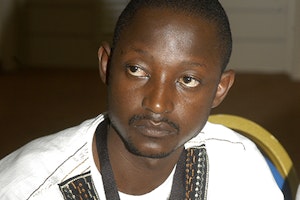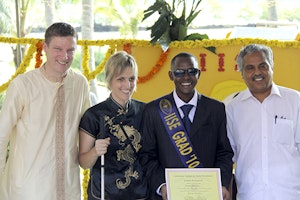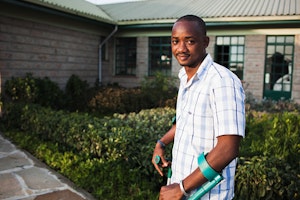Fighting for Disability Rights in Southern Africa
By Louise Olivier
In May this year, I was one of six people who spent two days at the Centre for Human Rights at the University of Pretoria interviewing shortlisted candidates in order to select the ten who would be sponsored to undertake a Master’s degree in disability rights law.
The applicants came from Zambia, Zimbabwe, Malawi, Ghana and Mozambique and had undergone a vigorous shortlisting process that reduced their number from 45 to 18. The interviews reduced the numbers to the final ten people– who will form Africa’s first ever pool of graduates specialising in disability rights.
This initiative is a joint project between a number of Open Society Foundations (OSF) programmes – the Disability Rights Initiative, the Scholarships Programme, the Higher Education Support Programme and the Open Society Initiative for Southern Africa (OSISA) – and is part of a concerted effort to promote and protect the rights of people with disabilities in southern Africa.
A study undertaken by OSF in 2010 covering nine countries in southern Africa provided evidence that the field of disability rights was severely underfunded and that the disability movement was not focusing on access to justice and rights promotion issues but rather on welfarist approaches to disability – and convinced OSF of the overwhelming need to support disability rights in the region.
Not a single university in the region was offering a speciality field of disability rights law resulting in a dearth of legal practitioners able to provide specialised legal assistance, aid and advice to people with disabilities.
Litigation as an advocacy tool for people with disabilities was also virtually non-existent. Donors were not investing in the field and disability rights organisations were unable to access funding.
This situation resulted in the most marginalised of communities remaining on the periphery of society, unable to access their rights, through both a lack of knowledge and an inability to use any structures that would provide the necessary support and knowledge to enable them to participate as active citizens and community members.
The extent of the difficulties and challenges faced by people with disabilities in the region – and the tenacity and determination required to overcome them – was encapsulated by one of the Masters candidates.
He had not managed to complete his undergraduate bachelor of commerce degree because, although his marks were good, he had not completed the income tax component and so his degree could not be awarded. We asked him why this particular subject eluded him. He told us that the University of Zimbabwe where he studies did not have provision for materials in Braille thus he passed his other subjects by getting a fellow student or friend to read the text books to him. He memorised them and then did his exams. But there was no-one who was able to read the income tax text book to him so he could not achieve his commerce degree.
This same man had brought a case to the High Court in Zimbabwe challenging electoral provisions that said that people with disabilities had to be assisted to vote thus meaning that their vote would never be secret. He won the case with the court ordering that disabled people are entitled to bring a person of their choice to assist them in casting a ballot rather than having an unknown presiding or polling officer do it on their behalf. He had worked tirelessly advocating for disability rights, yet one of the most basic, access to education, was out of his reach.
The project to provide disability rights scholarships attempts to address this injustice. It provides for full Masters tuition at universities such as McGill, Leeds, Galway, Cardiff and the American University in DC. On return to their home countries, the students will work in organisations and fields as diverse as the Human Rights Commission, film and production, AU and SADC structures, civil society organisations, the Reserve Bank and private legal practice all focusing on disability rights.
Not all the successful students have disabilities but all of them have indicated a strong commitment to disability work in their everyday lives. It is evident that their pursuit of further studies in this area of speciality is premised upon passion and a desire to provide access to justice and the protection and promotion of human rights for people living with disabilities.
And a core of dedicated professionals committed to the field of disability rights is sorely needed. Since entering the disability rights arena two years back it has been my experience that the movement on the continent is composed of a few individuals and organisations that do not see this work as a job but rather as a fundamental component of how they live their lives. It is under resourced, both in terms of finances and human expertise, skills and knowledge and the contribution that the OSF foundations and network programmes are making is a strong investment in a future generation of disability activists.
My initial interest in supporting disability rights work was sparked by anecdotal evidence that was presented to us by one of our partners in Mozambique. Terezinha da Silva from WLSA said that they had alarming reports of women being restrained in northern Mozambique as the community and family regarded them as witches. These women had psycho-social disabilities but since they were regarded as being “other” there was a perception that they needed to be restrained and were thus spending their days tied up in a yard.
They were poor, lived in a remote rural part of the country, had no access to support structures, were women and had a disability. Access to justice and rights protection would be essential to assist people who were in similar situations in the region. And sadly there are far too many.
Our initial support, which began in 2010, provided grants to universities in the region to provide a specialised disability rights course as part of the law degree and to ensure that law graduates were able to provide effective legal services for people with disabilities. Today we have legal aid clinics and disability rights programmes in three universities in Malawi, Mozambique and Zimbabwe.
The Zimbabwean and Malawian clinics are in rural parts of the country. Each university has over 20 students undertaking a six month disability rights course as part of their law degree and they work in the legal aid clinic. In 2012 they will be joined by universities in Zambia and Botswana.
They also work closely with the national disability movement in their countries in outreach activities and on advocacy initiatives to ratify the Convention on the Rights of Persons with Disabilities (CRPD) or on domestication efforts. Currently a project we are supporting in Zambia has a number of disability rights organisations revising that country’s Disability Act and Mental Health Act to ensure that it is in line with the provisions of the CRPD.
Their relationship with the state is a good one and they have been able to achieve much with the positive political will to legislate for the protection of the rights of people with disabilities. In the countries where we work capacity has been created and on-going rights based initiatives are being sustained.
One of the important advocacy tools that OSF uses to advance a rights based agenda is litigation and a component of our work, undertaken with the Southern Africa Litigation Centre, is to identify potential strategic litigation. Lesotho, Namibia, Botswana and Malawi have all presented interesting opportunities.
These cases focus on inclusive education, non-discrimination in the workplace and access to job opportunities and access to legal remedies for women with disabilities who are sexually abused. Currently work is being undertaken to initiate cases in national jurisdictions (with our in-country disability rights partners) that advance the rights of people with disabilities. There is potential to litigate before the African Court on Human and Peoples Rights on independent living and the right to be included in the community.
In February this year, while meeting with staff at the King George VI School for children and people with disabilities, we were told about the case of T who had been sexually abused and raped. As a disabled woman she faces every obstacle the system is able to throw at one; the criminal justice system is dysfunctional; there is no provision for assistance for disabled people when giving evidence; she cannot afford a lawyer; legal aid is virtually non-existent; and, most difficult of all, the stigma and stereotyping that one faces when you have a disability is debilitating.
Yet she persevered and insisted on giving evidence in court. Our project assisted her and provided a sign language interpreter that she was comfortable with. She made an outstanding witness and the accused was convicted. T had her justice.
And we had another indication of the impact that our disability rights work in southern Africa can have – illustrating how initiatives to advance the rights of people with disabilities are producing results that benefit people in their everyday lives, change attitudes and promote understanding of the incredible challenges that disabled people face.
While there is still much to do, the impact of the work can be felt.
Louise Olivier is a program manager with the Open Society Human Rights Initiative.


